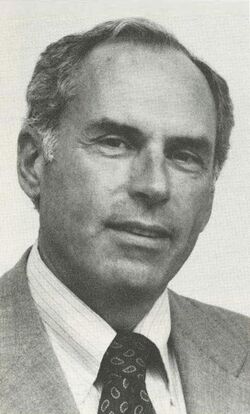Biography:Roy Amara
From HandWiki
Short description: American researcher, scientist
Roy Amara | |
|---|---|
 Amara circa 1980 | |
| Born | Roy Charles Amara |
| Died | 31 December 2007 (aged 82) |
| Nationality | American |
| Known for | Amara's law |
| Scientific career | |
| Fields | Futurism |
Roy Charles Amara (7 April 1925[1] – 31 December 2007[2]) was an American researcher, scientist, futurist[3] and president of the Institute for the Future best known for coining Amara's law on the effect of technology. He held a BS in Management, an MS in the Arts and Sciences, and a PhD in Systems Engineering,[4] and also worked at the Stanford Research Institute.
Amara's law
His adage about forecasting the effects of technology has become known as Amara's law and states:
We tend to overestimate the effect of a technology in the short run and underestimate the effect in the long run.[5][6][7]
The law has been used in explaining nanotechnology.[8]
Selected bibliography
Books
- Amara, Roy; Boucher, Wayne I. (1977). "The study of the future: an agenda for research". in National Science Foundation. Washington, D.C.: General Post Office. OCLC 3200105.
- Amara, Roy; Lipinski, Andrew J. (1983). Business planning for an uncertain future: scenarios & strategies. New York: Pergamon Press. ISBN 9780080275451. https://archive.org/details/businessplanning00amar.
- Amara, Roy; Morrison, J. Ian; Schmid, Gregory (1988). Looking ahead at American health care. Washington, D.C.: McGraw-Hill, Healthcare Information Center. ISBN 9780070013841.
- Amara, Roy; Institute for the future (2003). Health and health care 2010: the forecast, the challenge (2nd ed.). Hoboken, New Jersey: John Wiley & Sons. ISBN 9780470932513.
Reports
- Amara, Roy; Institute for the future (1972). A framework for national science policy analysis (Report). Menlo Park, California: Institute for the Future. P-18. OCLC 4484161. "Reprinted from IEEE transactions on systems, man, and cybernetics, v. SMC-2, no. 1 January 1972"
- Amara, Roy; Institute for the future (1972). Toward a framework for national goals and policy research (Report). Menlo Park, California: Institute for the Future. OCLC 11724396. "Reprinted from IEEE Transactions on systems, man and cybernetics, v. SMC-2, no. 5 November 1972"
- Amara, Roy; Institute for the future (1972). The social responsibilities of business (Report). Menlo Park, California: Institute for the Future. OCLC 5744644. "Prepared for the White House Conference on the Industrial World Ahead, Washington, D.C., 2–9 February 1972"
- Amara, Roy; Institute for the future (1973). Draft summaries of four workshops on the social impact of the computer (Report). Menlo Park, California: Institute for the Future. OCLC 709544477.
- Amara, Roy; Lipinski, Andrew J.; Institute for the future (1974). Strategic planning: penetrating the corporate barriers (Report). Menlo Park, California: Institute for the Future. OCLC 4349610.
- Amara, Roy; World Future Society (1975). The next 25 years: crises and challenges (Report). Menlo Park, California: World Future Society. P-31. OCLC 3693807. "Presented at the World Future Society Second General Assembly Plenary Session, June 2, 1975"
- Amara, Roy; Institute for the future (1975). Some methods of futures research (Report). Menlo Park, California: Institute for the Future. OCLC 2456542.
- Amara, Roy; Institute for the future (1975). Emerging societal issues: some suggestions for research (Report). Menlo Park, California: Institute for the Future. WP-22. OCLC 17817243.
- Amara, Roy; Institute for the future (1978). The U.S. in the decade ahead: an inventory of resources: American Vocational Association national convention, 4 December, 1978 (Report). Menlo Park, California: Institute for the Future. P-72. OCLC 7527420.
- Amara, Roy; Lipinski, Hubert; Spangler, Kathleen; Institute for the future (1978). Communication needs in computer modeling (Report). Menlo Park, California: Institute for the Future. P-67. OCLC 7511471. http://informs-sim.org/wsc78papers/prog78sim.html. Published in Conference proceedings 1978 Winter Simulation Conference (WSC 1978). Pdf.[9]
- Amara, Roy; Institute for the future (1978). The future of voluntarism: meeting changing societal needs (Report). Menlo Park, California: Institute for the Future. P-69. OCLC 7293285.
- Amara, Roy; Institute for the future (1978). Planning, futures and the skeptics (Report). Menlo Park, California: Institute for the Future. OCLC 6661254.
- Amara, Roy; Institute for the future (1978). Toward understanding the social impact of computers (Report). Menlo Park, California: Institute for the Future. R-29. OCLC 1166342.
- Amara, Roy; Institute for the future (1980). The future of management: ten shapers of management in the '80s (Report). Menlo Park, California: Institute for the Future. P-80. OCLC 8390527.
- Amara, Roy; Institute for the future (1980). Imperatives for tomorrow: the I's have it: images, institutions, involvement (Report). Menlo Park, California: Institute for the Future. P-87. OCLC 7917815.
- Amara, Roy; Institute for the future (1980). The futures field (Report). Menlo Park, California: Institute for the Future. P-95. OCLC 7919207.
References
- ↑ "Amara, Roy". Library of Congress. http://id.loc.gov/authorities/names/n77010151.html. Retrieved 18 February 2015. "data sheet (Amara, Roy Charles, b. 4/7/25)"
- ↑ Pescovitz, David (3 January 2008). "Roy Amara, forecaster, RIP". BoingBoing. http://boingboing.net/2008/01/03/roy-amara-forecaster.html. Retrieved 18 February 2015.
- ↑ Four Geeky Laws That Rule Our World
- ↑ "Roy Amara (biography)". University of Arizona: Anticipating the future (course), Futures Thinkers. http://ag.arizona.edu/futures/fut/amara.html. Retrieved 18 February 2015.
- ↑ Susan Ratcliffe, ed (2016). "Roy Amara 1925–2007, American futurologist". Oxford Essential Quotations. 1 (4th ed.). Oxford University Press. doi:10.1093/acref/9780191826719.001.0001. http://www.oxfordreference.com/view/10.1093/acref/9780191826719.001.0001/q-oro-ed4-00018679.
- ↑ "Encyclopedia: Definition of: Amara's law". PC Magazine. https://www.pcmag.com/encyclopedia/term/37701/amara-s-law. Retrieved 18 February 2015.
- ↑ Doc Searls (2012). The Intention Economy: When Customers Take Charge. Harvard Business Press. p. 257. ISBN 978-1-4221-5852-4. https://archive.org/details/intentioneconomy0000sear/page/257.
- ↑ Context
- ↑ Roy Amara at DBLP bibliography
 |

